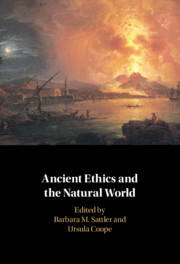Book contents
- Ancient Ethics and the Natural World
- Ancient Ethics and the Natural World
- Copyright page
- Dedication
- Contents
- Contributors
- Note on the Editors
- Introduction
- Part I Humans in Nature: Nature and Law, Humans and Natural Catastrophes
- Part II Humans as Godlike, Gods as Humanlike: Presocratics and Platonists
- Part III Emotions, Reason, and the Natural World (Aristotle)
- Part IV Action and the Natural World (Aristotle)
- Part V The Naturalness of Goodness
- Chapter 10 Eudoxus’ Hedonism
- Chapter 11 Aristotle and Socrates in the Eudemian Ethics on the Naturalness of Goodness
- Bibliography
- Index Locorum
- General Index
Chapter 10 - Eudoxus’ Hedonism
from Part V - The Naturalness of Goodness
Published online by Cambridge University Press: 13 August 2021
- Ancient Ethics and the Natural World
- Ancient Ethics and the Natural World
- Copyright page
- Dedication
- Contents
- Contributors
- Note on the Editors
- Introduction
- Part I Humans in Nature: Nature and Law, Humans and Natural Catastrophes
- Part II Humans as Godlike, Gods as Humanlike: Presocratics and Platonists
- Part III Emotions, Reason, and the Natural World (Aristotle)
- Part IV Action and the Natural World (Aristotle)
- Part V The Naturalness of Goodness
- Chapter 10 Eudoxus’ Hedonism
- Chapter 11 Aristotle and Socrates in the Eudemian Ethics on the Naturalness of Goodness
- Bibliography
- Index Locorum
- General Index
Summary
This chapter uses Aristotle’s account in the Nicomachean Ethics to reconstruct Eudoxus’ argument for the thesis that pleasure is the good. He sets out and explains Eudoxus’s argument from universal pursuit: pleasure must be the good because all animals pursue pleasure in all natural and fitting choices. Eudoxus’ naturalism is an important background assumption here. He assumes that each animal, by nature, successfully chooses in all situations what is good for itself. This allows him to move from an observation about the universal pursuit of pleasure to the claim that pleasure is a feature of all natural and good choices. The pleasure that features in such choices is overall pleasure. Thus, Eudoxus can allow that animals sometimes naturally choose things that are painful, provided that what they choose contains more pleasure than pain overall. Aufderheide ends by suggesting how Eudoxus might defend the claim that pleasure is not merely a good, but moreover the good. This is not to claim that pleasure is the only thing that is good, but rather that pleasure plays a unique role in relation to choice: it is the only thing that features in all natural and good choices as a good.
- Type
- Chapter
- Information
- Ancient Ethics and the Natural World , pp. 185 - 202Publisher: Cambridge University PressPrint publication year: 2021
- 1
- Cited by

